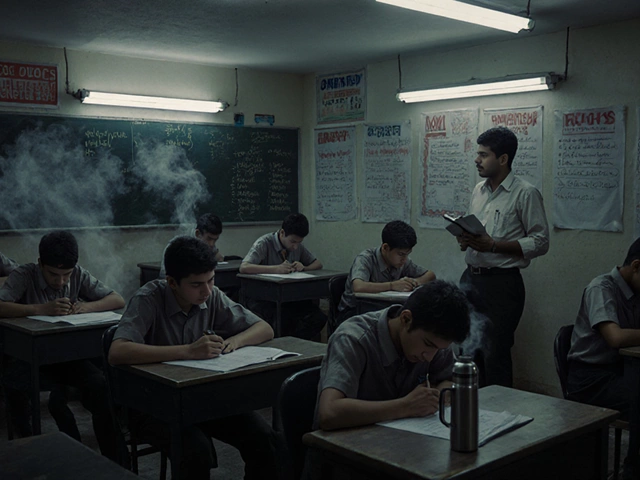The path to acing IIT JEE Chemistry demands navigating through an array of challenging topics, each with its own complexities. While some chapters might seem more daunting than others, recognizing these challenging sections is the first step towards mastering them.
For many JEE aspirants, chapters such as Thermodynamics, Electrochemistry, and Organic Chemistry seem overwhelmingly tough. Each of these areas comes with concepts that require a deep understanding and the ability to apply knowledge in varied scenarios. However, with strategic approaches and the right tools, these challenges can be effectively managed.
- Identifying the Toughest Chemistry Chapters
- Understanding Complex Reactions
- Physical Chemistry Challenges
- Organic Chemistry Intricacies
- Effective Study Strategies
Identifying the Toughest Chemistry Chapters
When it comes to cracking the IIT JEE, especially the chemistry section, students often find themselves tangled in a web of complex chapters that require both analytical skills and conceptual understanding. Determining which chapters are inherently tough can be subjective, but a few consistently challenge even the brightest minds. Thermodynamics stands out as a particularly grueling topic. It dives deep into the science of energy conversion, heat exchange, and the inherent properties of matter which spawn intricate problems that require a systematic approach to solving. Aspirants must not only memorize the laws but also understand their applications in various scenarios.
Another chapter that often makes students quiver is Organic Chemistry. This section is infamous for the myriad of reactions and compounds one has to master. From understanding carbon chains to nailing down reaction mechanisms, this subject tests one’s ability to recognize patterns and predict results. The vastness of the topic often leaves students overwhelmed, and it demands a grasp of fundamental concepts to build further understanding. As one JEE veteran put it, "Organic Chemistry is not just about memorizing reactions; it’s a language that tells a story".
Physical Chemistry chapters like Electrochemistry pose their own set of hurdles. This chapter merges physics concepts with chemistry, requiring an adept understanding of ionic movements, electrode potentials, and redox reactions. It's a blend of theoretical knowledge and practical application, often demanding students to solve mathematical problems based on real-world contexts. The ability to switch between calculative and conceptual thinking is vital here.
Each of these chemistry topics for IIT JEE preparation holds a unique challenge. Approaching them with a strategic mindset can ease the process. Recognizing personal strengths and weaknesses can guide where time and effort should be spent. Dedication to daily practice and problem-solving, with a focus on understanding rather than rote learning, can gradually turn these daunting topics into conquering achievements.
Understanding Complex Reactions
Diving into the world of complex chemical reactions is like unfolding the pages of an endless adventure book. Each reaction tells a story, and to truly master them, you must become fluent in the language of chemistry. Imagine the intricate dance of atoms and molecules, constantly seeking optimal states of energy—this is the essence of chemical reactions. For IIT JEE aspirants facing these elaborate mechanisms, it’s crucial to first break down reactions into understandable bits. By analyzing individual components, the relationships and transformations become clearer, leading to a comprehensive understanding of chemical behavior.
One such challenging topic under the complex reactions umbrella is Organic Chemistry. Here, understanding the structure and function of carbon-based compounds is key. Whether dealing with substitution reactions or rearrangements, each requires not only rote memorization but a deep conceptual understanding. What makes these reactions tough is their dynamic nature—a slight change in conditions or reactants can vastly alter the outcome. According to expert chemist Dr. Sanjay Bhargava,
"Real progress in understanding organic reactions comes when students visualize them in three dimensions, seeing how molecules interact spatially."This graphical visualization, often supported by modeling kits, helps solidify abstract concepts into tangible knowledge.
Physical Chemistry also houses its own set of complex reactions, notably in areas like Reaction Kinetics and Equilibrium. Here, understanding the kinetics behind reactions allows students to predict how fast a reaction proceeds under certain conditions. Mastering these topics often involves grappling with equations and rate laws, understanding how temperature, pressure, and concentration affect reaction rates. A strong grasp of these principles forms the bedrock of predicting the behavior of reactions in real-world applications. One effective strategy for taming these topics is linking chemical properties with their physical phenomena, achieved through solving numerous practice problems and engaging in hands-on experiments.
Approaching Reaction Mechanisms
Unraveling reaction mechanisms requires a strategic approach. Many students find it useful to start by studying well-known mechanisms, such as the SN1 and SN2 reactions. Here, the substitution patterns and the role of nucleophiles and leaving groups take center stage. As learners grow more comfortable, they can tackle hybrid mechanisms and their respective nuances. A significant aspect of mastering these mechanisms is the ability to visualize how electrons move within reactions. Students often find drawing mechanisms step-by-step helpful, ensuring they don't miss subtle movements that can impact the reaction outcome.
The use of digital tools and simulations adds layers to understanding these complex processes. With interactive software, students can visualize the intricate dance of particles during reaction transitions. This aids retention and places theoretical knowledge into a framework of practical application. As students advance, they can refine their understanding by creating their compilation of reaction types and categorizing them by mechanisms, outcomes, and conditions.

Physical Chemistry Challenges
Physical Chemistry is often perceived as a labyrinth of formulas and abstract concepts, posing a considerable challenge for IIT JEE aspirants. It bridges theoretical concepts with experimental phenomena, requiring an intricate understanding of both. Key topics include Thermodynamics, which delves into the laws of energy transformation, and Electrochemistry, which explores the intriguing world of ionic exchanges and electrode potentials. These subjects demand not just rote learning but a grasp of conceptual fundamentals and mathematical applications.
IIT JEE Chemistry seekers often find the abstract nature of Physical Chemistry intimidating. Understanding the spontaneity of reactions or calculating Gibbs free energy isn't just about memorizing formulas; it involves a deep dive into the why and how of chemical processes. Often, Thermodynamics can stump students until they visualize its real-world applications. Electrochemical Cells are another tricky aspect; understanding how they function requires analyzing each component's role, from salt bridges to half-cells.
Aspirants must balance between conceptual clarity and problem-solving ability. The root of success lies in tackling foundational concepts first, ensuring a rock-solid base before approaching complex problems. As
Albert Einstein once remarked, "Creativity is intelligence having fun," recognizing the elegance in these physical phenomena can transform these challenges into engaging puzzles. Embracing curiosity, therefore, can be your most potent tool.This immersive engagement ensures that you're not merely rattling off definitions but actually understanding the core ideas.
Another aspect of mastering Physical Chemistry involves adapting effective strategies. Constant practice with previous years' JEE questions is essential. There are distinct patterns in how problems are framed, and identifying these nuances can give students a significant edge. For example, when delving into the intricacies of the Nernst equation or calculating equilibrium constants, it's crucial to practice diverse variations of each problem. To make learning less daunting, break these down into consistent daily exercises; dedicate time to revisiting each formula and its derivations, as this repetition embeds clarity.
Utilizing group studies can also prove beneficial. Discussing these topics with peers often reveals new perspectives and techniques to approach questions. Formulas become more than just equations on a page when they're dissected and debated over study sessions. Furthermore, many learners find quizzes and competitions engaging, offering both challenge and motivation to improve.
Organic Chemistry Intricacies
Delving into the complexities of Organic Chemistry can seem daunting for many IIT JEE candidates. This area of study fascinates as much as it mystifies, primarily due to the sheer variety of reactions and mechanisms involved. Understanding topics such as reaction mechanisms, stereochemistry, and aromatic compounds is crucial for navigating this intricate chapter. The key to mastering Organic Chemistry lies in recognizing patterns and understanding the behavior of different functional groups. It's about seeing the forest for the trees, knowing when a carbon atom will seek a positive charge, or when an electron cloud will attract nucleophiles. Such knowledge forms the bedrock of tackling difficult problems effectively in the IIT JEE exams.
The diverse world of organic compounds often introduces learners to complex isomerism, which can trip anyone who merely memorizes without comprehension. Isomers, particularly stereoisomers, require an insightful grasp of spatial orientation that goes beyond textbooks. Candidates need to visualize molecules in three dimensions, understanding how their geometric structure influences reactivity and properties. A methodical approach to these concepts often involves recurring practice and the diligent use of molecular models, evolving knowledge through empirical observation and thoughtful application.
One cornerstone of Organic Chemistry is mastering the varied reaction types, such as addition, elimination, and substitution. These reactions transform hydrocarbons into an astonishing range of compounds, each with unique properties. Crafting a solid understanding of these reactions involves recognizing the conditions under which they occur, the catalysts involved, and the steric and electronic effects that dictate the course of a reaction. For example, knowledge about nucleophilic and electrophilic substitution reactions not only clarifies the reaction pathways but also empowers students to predict the outcomes efficiently in unfamiliar scenarios.
"The essence of Organic Chemistry resides in the molecules' story told through reactions. It's not just chemistry, it's narrative," once noted Dr. Linus Pauling, a four-time Nobel laureate.
It's essential to grasp the concept of hybridization, resonance, and electron distribution. Resonance structures, while sometimes misleading, help illuminate the true nature of the organic molecules. Knowing how electrons are shared or delocalized across a molecule paves the path to understanding its stability and reactivity. Students often blend creativity and logic when deciphering these concepts, drawing parallels between theoretical frameworks and practical manifestations.
| Type of Reaction | Common Reagents |
|---|---|
| Addition | HCl, HBr, Hydrogen |
| Elimination | Alcohol, Acid |
| Substitution | Halogens, Hydroxide ions |
Lastly, preparing for the IIT JEE focuses not only on understanding foundational theory but also on implementing tactical strategies. Incorporating visual aids, such as charts and graphs, can help crystallize the links between different reactions. Practice problems that emphasize organic reaction mechanisms contribute significantly to developing intuition and speed. Between quality textbooks, online resources, and peer discussions, consistent engagement with the material will pave the way towards conquering the complexities of Organic Chemistry and ultimately achieving IIT JEE Chemistry success.

Effective Study Strategies
Tackling the toughest chemistry chapters in the IIT JEE Chemistry syllabus requires not just hard work, but also smart study strategies. One effective approach is to engage deeply with the fundamental concepts before diving into complex problems. This foundational understanding is especially vital when dealing with topics like thermodynamics and electrochemistry, as these subjects build sequentially on core principles. An often-cited mantra among successful JEE aspirants is 'concepts over rote learning,’ a mindset that encourages a deeper engagement with the material. By breaking down these difficult topics into more digestible parts, students can better navigate the intricacies of each theory and its applications.
Creating a solid, achievable study plan is another crucial step. Start by mapping out the syllabus, marking chapters that appear frequently in past examinations. Prioritize these by difficulty level and familiarity. Organizing your time effectively to cover these areas ensures that you’re systematically approaching the breadth of the curriculum without feeling overwhelmed. Regular revisions and setting aside dedicated time slots for problem-solving practice can significantly enhance retention and application skills. It’s beneficial to integrate different types of materials into your study sessions, including textbooks, online resources, and practical videos, as this multimodal approach aids in strengthening understanding.
Staying consistent and disciplined plays a pivotal role in mastering challenging topics. Setting specific, achievable goals every week helps maintain focus and motivation over the long term. Resist the temptation to jump randomly between chapters; instead, steadily increase the complexity of the material. Collaborating with peers or joining study groups might provide a new perspective on complex problems by discussing and debating different approaches. This communal learning can also help demystify difficult areas because explaining concepts to others invariably solidifies your own understanding.
"The secret of getting ahead is getting started," wisely observed by Mark Twain, resonates well with JEE aspirants. Beginning your preparation with enthusiasm and a structured plan is often the most challenging part, but it sets the stage for long-term success.
Utilizing previous years’ question papers as a testing ground is an invaluable technique. It enables aspirants to identify common patterns and familiarizes them with the exam's structure and time constraints. When practicing these, simulate exam conditions by timing each session, which can help hone your time management skills—an essential component during the actual exam. It is useful to maintain an error log to keep track of mistakes made, which can provide insights into areas that require more focus. Reinforcing these weak spots often leads to tangible improvements in performance.
Lastly, incorporating stress management techniques like short breaks, meditation, or physical exercise into your routine can greatly enhance productivity and prevent burnout. These activities are not merely ancillary; they are integral to sustaining the mental and physical endurance required for intense study periods. A healthy mind and body create the optimal condition for absorbing and retaining challenging material. Remember, a balanced lifestyle can often tip the scales from merely understanding tough concepts to mastering them.





